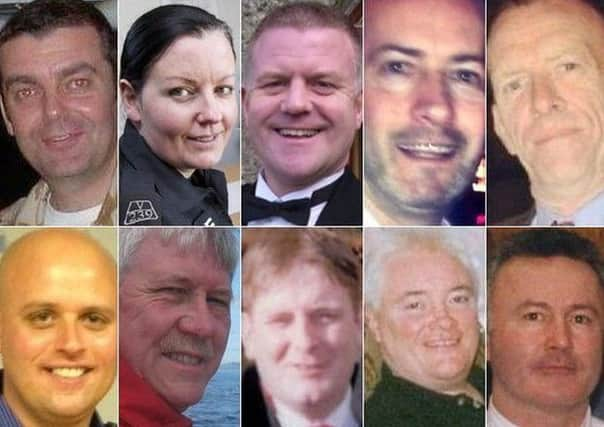No evidence of fuel contamination in Clutha helicopter, inquiry told
This article contains affiliate links. We may earn a small commission on items purchased through this article, but that does not affect our editorial judgement.


Expert witness Robert Vickery, a senior inspector of air accidents (engineering) at the Air Accidents Investigations Branch (AAIB) arrived at the crash site the morning after the accident, where he found “no smell of fuel or leakage.”
He said a subsequent analysis of the aircraft and its fuel tanks indicated there was nothing to suggest fuel contamination had played a part in the flight’s demise.
Advertisement
Hide AdAdvertisement
Hide AdA Fatal Accident Inquiry (FAI) into the tragedy, which claimed the lives of ten people when the twin engine Eurocopter EC 135 crashed into Glasgow’s Clutha Bar on 29 November 2013, heard Mr Vickery describe how tests were carried out on on fuel samples from the helicopter’s main tank and one of its supply tanks. No water was found in any sample.
The court earlier head evidence concerning a manufacturer’s information notice dated 21 January 2013 in which Eurocopter detailed several “fuel quantity indication failures” with the EC 135.
Tests established the “most probable root cause is contamination of the fuel probe with water.” The notice added there was a potential risk that the helicopter’s caution advisory panel “shows a higher fuel quantity level compared to the actual fuel level within the fuel tank system.”
The inquiry also heard how manufacturer tests using a fuel system test rig found that when water or an additive mix became emulsified in the fuel, it caused “fuel sensor output frequency drift” which resulted in the caution advisory display’s fuel contents display overreading for the main and supply tanks.
During cross examination by Donald Findlay QC, representing the family of Robert Jenkins, Mr Vickery was asked: “You are talking about the possibility, not the fact, that there may be an overead where it stated there is more fuel than there actually was?”
“Yes, that’s correct,” he replied.
Mr Findlay asked: “It’s only a possibility, not a fact?”
Mr Vickery, a 58-year-old former Lieutenant Commander in the Royal Navy, responded: “That’s correct.”
Mr Findlay later asked him: “From what you saw and were able to discover, did you see any indication thar fuel contamination of any kind had any part to play in the demise of this aircraft?”
Mr Vickery replied: “No, there was no indication.”
Asked he if would expect to see any signs of fuel contamination, he said he did not, adding: “This is a small helicopter. Its throughput of fuel is quite rapid,” meaning it would be “barely detectable.”
Advertisement
Hide AdAdvertisement
Hide AdMaintenance records for the helicopter showed that a fuel sensor was replaced in July 2013. Mr Vickery said three other sensor issues were raised in October that year, one of which found that the display for the second supply tank indicated there was 11kg of fuel present when in fact it was empty.
A 2015 AAIB report into the crash stated: “The operator had experienced occasional erroneous fuel quantity indications on EC 135 helicopters. When diagnostic or rectification action was taken, no fault with the fuel sensor or quantifiable contamination of the fuel was found. Replacement of the fuel sensor units seemed to correct the fault.”
It added: “The evidence suggested that water contamination may have been the root cause but the exact mechanism was not fully understood.”
The helicopter’s pilot, David Traill, 51, along with PC Tony Collins, 43, and PC Kirsty Nelis, 36, were among those who lost their lives. Also killed were seven customers of the popular bar in the city’s Stockwell Street. They were: Gary Arthur, 48; Joe Cusker, 59; Colin Gibson, 33; Robert Jenkins, 61; John McGarrigle, 58; Samuel McGhee, 56; and Mark O’Prey, 44.
The inquiry, which is taking place at a temporary court in Glasgow’s Hampden Park before Sheriff Principal Craig Turnbull, continues.